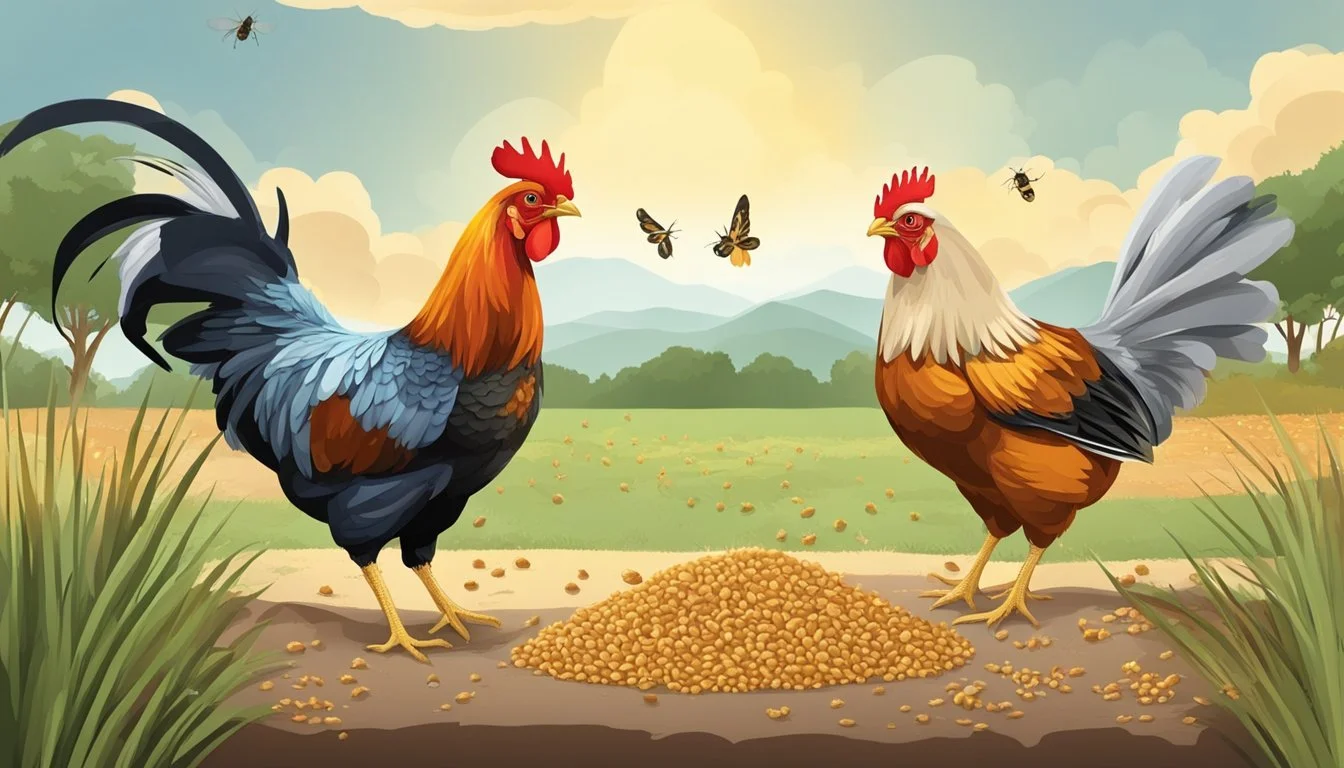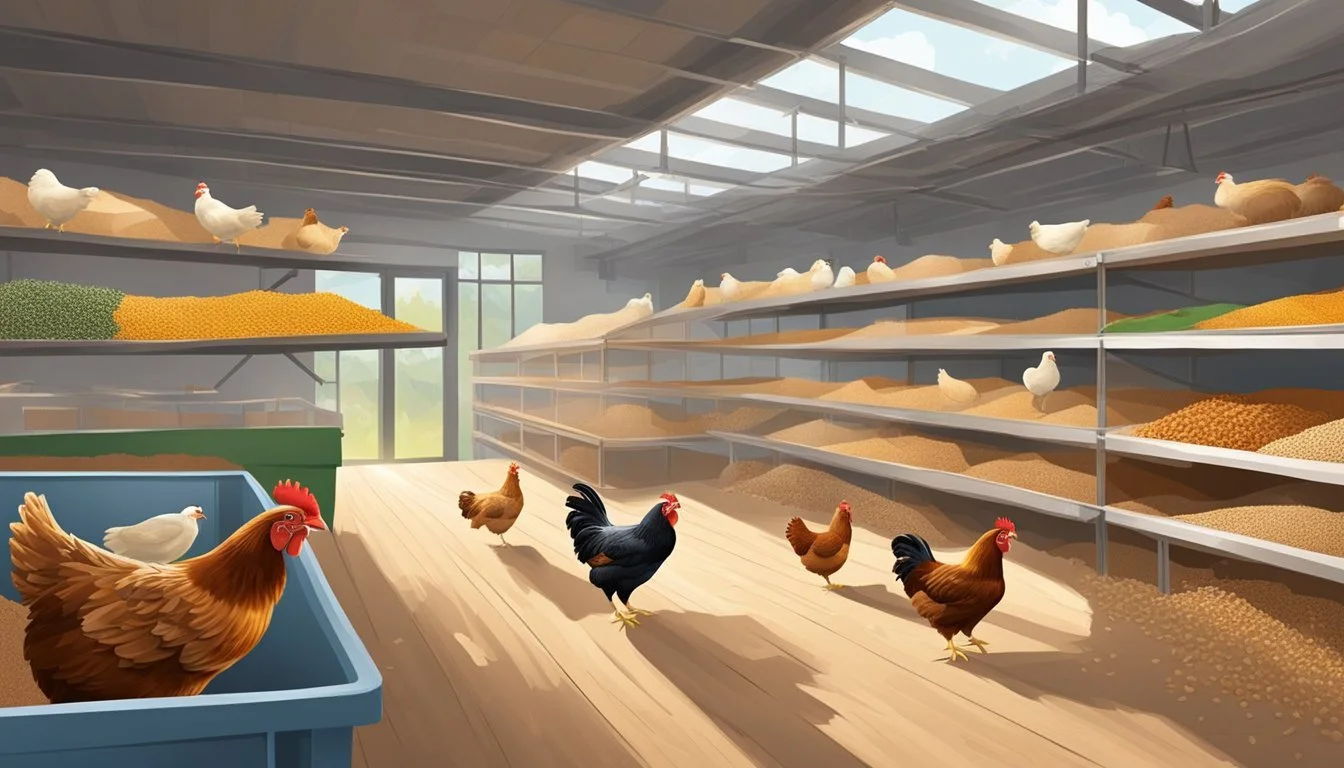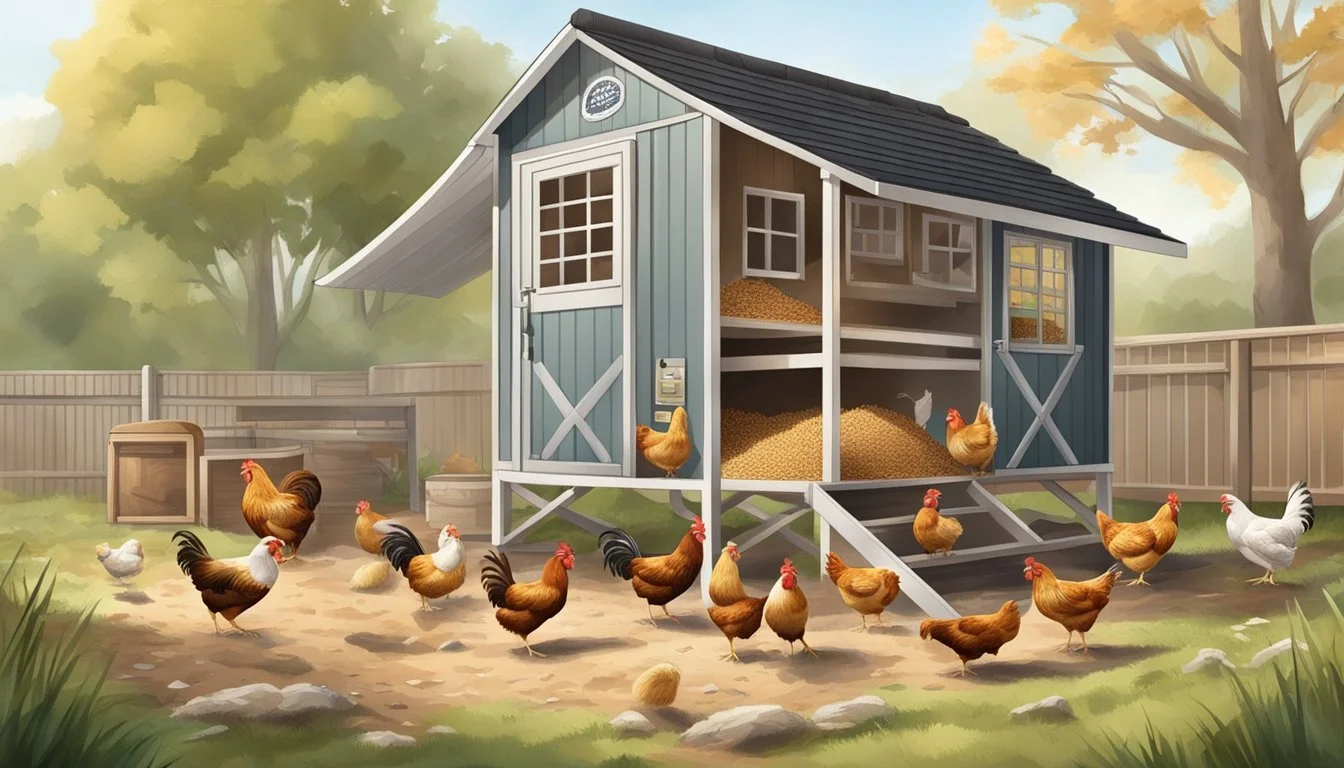How do I ensure that my chickens are getting enough protein?
Top Strategies for Optimal Nutrition
Proper nutrition is critical for maintaining the health and productivity of chickens, and protein plays a significant role in their diet. For chicken owners, understanding how to meet these dietary requirements is essential. Chickens need adequate protein not only for growth and muscle development but also for egg production, molting, and overall well-being. Insufficient protein can lead to various health issues, including slow growth, decreased egg output, and poor feather quality.
Determining the right amount of protein for a flock involves looking into the different life stages of the chickens, their purpose (whether for egg-laying or meat), and their overall health. Commercial feeds typically provide a balanced diet for chickens, with specific formulations designed for layers or broilers. However, supplemental protein sources can help ensure chickens receive all the necessary nutrients, especially during periods of higher stress or production, like molting or peak laying. It's crucial to select appropriate supplements and understand how they fit into the chickens' diet to avoid any nutritional imbalances.
Offering a variety of protein-rich foods is one way to increase protein intake. However, it's important to introduce any new foods gradually and monitor the flock's response. Because chickens have differing nutritional needs, a one-size-fits-all approach does not apply. Integrating high-protein snacks, such as fish meal or pumpkin seeds, should be done with care to avoid any adverse effects, such as flavor changes in eggs or overconsumption of certain nutrients. Hence, chicken owners must be well-informed and attentive to their flock's dietary needs to maintain optimal health and productivity.
Understanding Protein in a Chicken's Diet
Protein is a pivotal component of a chicken's diet, influencing everything from growth to egg production. Ensuring a diet rich in high-quality protein is vital for the health and productivity of chickens.
Essential Amino Acids and Dietary Protein
Dietary protein provides the essential amino acids that chickens cannot synthesize by themselves. These amino acids are the building blocks of proteins necessary for the growth, repair, and maintenance of body tissues. Chickens need a variety of amino acids in their diet, including lysine and methionine, which are particularly important. A deficiency in essential amino acids may lead to stunted growth, poor feather quality, and reduced egg production. Dietary proteins that are high-quality for chickens come from various sources such as fish meal and pumpkin seeds, both known for their rich protein content.
Role of Protein in Chicken Development
Protein plays a critical role in the development of chickens, from hatching through adulthood. It's essential for the formation of muscles, organs, and the immune system. In laying hens, adequate protein intake is crucial for consistent egg production and quality. The diet of chickens should be formulated to match their protein requirements, which vary by life stage; for instance, a layer feed typically contains between 16-18% protein to support egg production, while broiler feed is higher in protein to promote muscle growth. It's important to provide balanced protein levels, as excessive protein can lead to health problems and environmental concerns due to excessive nitrogen excretion.
Protein Requirements Across Different Life Stages
Proper protein intake is critical for chickens at each stage of their lifecycle, influencing not only growth and development but also egg production and overall health.
Chick Starter Diets for Baby Chicks
For the initial weeks of life, baby chicks require a high-protein chick starter diet to support their rapid growth and feather development. From hatching until about 6 weeks of age, they should be provided with a diet that consists of approximately 18-20% protein. It's essential that the protein content for baby chicks be at the recommended level to ensure proper growth.
Laying Hen Nutrition
As pullets transition to laying hens, their protein requirements alter to support consistent egg production. A layer feed typically features 16-18% protein; this level is meticulously balanced to ensure hens have enough protein to produce eggs without the risk of health issues like obesity, which can occur if the protein level is too high.
Cockerels and Roosters
Contrary to laying hens, roosters and non-laying cockerels require less protein. An ideal diet for them would consist of a maintenance feed with about 14-16% protein. This level is sufficient to maintain their health and muscle mass without the excess that could lead to unnecessary weight gain. It's important that the feed formulation for roosters and cockerels be specific to their gender and life stage.
Chickens at various life stages have different protein needs, and meeting these needs is a cornerstone of good poultry nutrition. By tailoring their diets to these stages—from the protein-rich chick starter diets to the balanced layer feeds—poultry owners can help ensure the health and productivity of their chickens.
Natural Protein Sources and Supplements
To meet their nutritional needs and maintain optimal health, chickens require a diet rich in protein. Protein is crucial during periods of growth, molting, and egg production. It's essential to incorporate a variety of natural protein sources and protein supplements in their diet.
Insects and Grubs as Protein Snacks
Chickens naturally forage for insects and grubs, such as earthworms and black soldier fly larvae, which are excellent sources of protein. Providing a habitat in the coop area that encourages insect life can be a sustainable way to supplement your chickens' diet. Offering dried mealworms is another convenient option, as they are a protein-packed snack that chickens love.
Seeds and Grains
Seeds such as sunflower seed and grains like oats and wheat can also contribute to a chicken's protein intake, although in lesser amounts. Seed and grain mixes should be chosen carefully to ensure that they are an appropriate supplement to the chickens’ regular feed and not the sole source of protein.
Animal Protein and Meat Products
Animal-based protein sources are highly nutritious for chickens. Fish meal is rich in protein and essential omega-3 fatty acids, yet it’s important to use sparingly to prevent off-flavors in eggs or meat. Meat scraps and cat food can also serve as additional protein sources but should be given in moderation considering their salt content and the risk of creating a preference for these over regular feed.
Kitchen Scraps: Dos and Don'ts
While kitchen scraps can offer variety, they should only comprise a small portion of a chicken's diet. High-protein kitchen scraps, like garden peas, lentils, and pumpkin seeds, can be beneficial. However, avoid anything too salty or containing harmful substances for chickens. Always evaluate the nutritional content of scraps to avoid disrupting the balance of their overall diet.
Commercial Feeds and Formulated Diets
When aiming to ensure chickens receive adequate protein, commercial feeds and formulated diets are reliable options as they are specifically crafted to meet the nutritional requirements of poultry. These feeds typically offer a balanced intake of protein, vitamins, and minerals necessary for the health and productivity of chickens.
Understanding Feed Labels
Feed labels provide essential information about the contents of commercial chicken feed, which usually includes a percentage of crude protein. For example, a label may indicate whether the feed includes 16% protein or 18% protein, guiding owners to select a diet suitable for their chickens' needs. In addition, the labels list vital content such as calcium, vitamins, and minerals, all of which play crucial roles in the health of the birds.
Choosing the Right Type of Feed
Selecting the correct type of feed is critical in feeding chickens effectively. For layers, a feed with sufficient calcium is essential for strong eggshell formation. In contrast, feeds labeled as "all flock" can cater to various poultry irrespective of their life stage, containing a broad spectrum of nutrients. It's essential to ensure the chosen feed's protein content aligns with the specific needs of the chicken, whether they are for meat production, egg-laying, or general maintenance.
Supplemental Nutrients for Optimal Health
Ensuring that chickens receive enough protein is critical, but for optimal health, their diet must also include a range of supplemental nutrients. These boost immune function and support bodily processes.
Vitamins and Minerals
Chickens need a variety of vitamins and minerals to maintain their health. Vitamins A, D, E, and a suite of B-vitamins are essential for functions ranging from vision to immune response. Minerals are just as crucial, with calcium playing a stellar role in shell formation and skeletal health, while phosphorus works in tandem with calcium to support bone structure. Zinc and selenium are trace minerals that aid in cellular metabolism and overall vitality.
A chicken's diet often includes these nutrients, but gaps can be filled with specific supplements. For instance, adding greens rich in vitamin E can bolster the diet naturally. For minerals, oyster shells are a common calcium supplement, ensuring strong eggshells and skeletal structure.
Balancing Diet with Calcium and Other Supplements
The balance of calcium and phosphorus is vital for bone health and metabolic functions. Too much calcium can hinder the absorption of other minerals, while too little can lead to weak bones and eggshells. Commercial feeds are designed to offer a balanced ratio, typically around 2:1 calcium to phosphorus. For laying hens, supplemental calcium is often provided in the form of crushed oyster shells or limestone.
Other supplements may include sources of omega-3 fatty acids, which improve the nutritional value of eggs and the health of the chicken. Flaxseed is a common omega-3 supplement. In terms of amino acids, methionine and lysine are critical and are sometimes offered through high-protein snacks or supplements to ensure chickens receive the full array of necessary amino acids.
Common Dietary Concerns and Myths
When aiming to maintain an adequate protein intake for chickens, it is essential to balance their diet while being aware of certain foods that can be harmful. Overconsumption and inclusion of toxic food items are common concerns that require attention to ensure poultry health.
Effects of Overconsumption
Overconsumption of protein can lead to an imbalance in nitrogen levels, which may cause unnecessary stress in chickens. High protein levels can exacerbate kidney issues or lead to other health problems. It is important to provide a diet tailored to the chickens’ age and productivity level, as laying hens have different dietary needs compared to broilers or young chicks.
Food Items to Avoid
Chickens should not be fed certain food items that can be toxic or harmful:
Avocado: The flesh and the pit contain persin, which is toxic to chickens.
Raw or green potatoes: They contain solanine, a substance that is also toxic to chickens.
Garlic: While some chicken owners use garlic as a natural health supplement in small quantities, it can be harmful in large amounts.
Rhubarb: The leaves and stems contain oxalic acid, which can be toxic.
Salt: Excessive salt can lead to health issues such as salt poisoning.
Cooked food scraps: While certain cooked foods can be safe, it is crucial to avoid overfeeding as it can dilute a balanced diet.
It is generally advised to avoid feeding chickens any food to avoid for humans, as the same principles often apply to poultry. The purpose of avoiding these items is to prevent overconsumption and exposure to toxic substances which can adversely affect the health and productivity of your flock.
Feeding Practices Through the Seasons
Proper nutrition is essential for chickens year-round, but their dietary needs shift with the changing seasons. This section explores how to adjust their diet in winter and summer to maintain optimal protein levels.
Adjusting Diet for Winter
During winter, chickens require more protein to regulate body heat and stay healthy amidst the cold temperatures. Owners can augment their regular feed with high-protein snacks like sunflower seeds, which are rich in fat and help provide extra energy. Adding animal protein sources is also beneficial; fish such as tuna or mackerel, and even small amounts of shellfish can be offered sparingly to increase dietary protein and maintain feather health.
Summer Feeding Strategies
In summer, when chickens are typically more active and forage widely, they may naturally consume more insects and greens, which helps sustain their protein levels. However, when rearing meat birds in warmer months, extra attention to protein is imperative for proper growth. While the core diet may be sufficient, supplementing with protein sources like cooked eggs or mealworms can help ensure meat birds are developing as expected without overburdening their digestive systems.
Identifying and Addressing Protein Deficiencies
Chickens require adequate protein for various physiological functions, including feather growth and maintenance, especially during molting periods. Owners should closely monitor their chickens for signs of protein deficiency, which can manifest as brittle or poor-quality feathers, significant feather picking, and disruptions in normal molting cycles.
One of the most prominent symptoms is a decrease in feed intake, leading to weight loss and potentially stunted growth in younger birds. Such signs are indicators that the poultry's diet may lack sufficient protein or specific amino acids, like methionine, which is crucial for feather development.
To address these deficiencies, the diet should be analyzed and adjusted. Many commercial feeds are formulated to meet protein requirements; however, during molting or when deficiencies are noticed, a higher protein feed may be necessary. Addition of protein-rich supplements, such as mealworms or fish meal, could significantly improve the condition. Furthermore, incorporating sources of omega-3 fatty acids can bolster overall health and feather quality.
Below is a simple checklist for chicken owners:
Observe Feathers and Behavior:
Brittle, poor-quality feathers
Excessive feather picking
Disturbed molting
Monitor Physical Condition:
Weight loss
Stunted growth in young birds
Evaluate and Enhance Diet:
Ensure commercial feed meets protein requirements
Provide higher protein feed during molting
Supplement with mealworms, fish meal, or other protein sources
Include omega-3 rich foods for feather and health support
Regular assessment and diet management can prevent protein deficiencies. If tailored feeding practices do not resolve issues, consulting a veterinarian or a poultry nutrition specialist is recommended.
Raising Backyard Chickens: Best Practices
When raising backyard chickens, providing a balanced diet is crucial for their well-being. Chickens require protein for growth, egg production, and general health. It is recommended to give chickens free-range access where they can forage for insects, which are protein-rich.
Feeding Guidelines:
Starter Feed: For chicks 0-8 weeks old, a starter feed with 18-20% protein is suitable.
Grower Feed: From 8-14 weeks, a starter/grower feed with 16-18% protein is advised.
Layer Feed: Beyond 18 weeks, a layer feed with at least 16% protein supports egg laying.
Protein levels should be monitored, and if one's free-range space is limited, supplementing with high-protein feeds or treats might be necessary.
Healthy Treats:
Moderation is key when offering treats to chickens. Healthy, organic options such as mealworms, cooked eggs, and seeds can boost protein intake without causing nutritional imbalances.
Flock Management:
Routine check-ups by a veterinarian are essential to detect any dietary deficiencies early. If chickens show signs of protein deficiency, such as reduced egg production or feather loss, one should evaluate the diet immediately.
Movement is also important for chickens. A spacious coop and run allow for necessary exercise and natural behaviors, enhancing overall health.
In summary, for one's chickens to thrive, they should:
Provide access to forage and free-range areas.
Follow age-appropriate feeding guidelines.
Offer healthy treats in moderation for additional protein.
Include regular veterinary check-ups for flock health.
Ensure the coop and run allow for ample movement and natural chicken behaviors.
Conclusion
Ensuring chickens receive sufficient protein is crucial for their health and productivity. Owners should monitor dietary intake and consider incorporating high-protein supplements when necessary.
Key Points:
Protein is essential for muscle development, feather growth, and egg production.
A varied diet, including sources such as fish meal and pumpkin seeds, can boost protein levels.
One must be mindful of the balance between protein-rich foods and regular chicken feed to preserve overall nutritional balance.
Owners should research and comply with local regulations, especially when contemplating the addition of meat and bone meal, due to potential disease transmission concerns.
Regular observation of the chickens' health can provide indicators of protein deficiency, such as stunted growth or poor feather condition. Should these signs appear, an evaluation of the feeding regimen is advised. Adjustments should be made to mitigate any shortcomings in nutritional provision.
Adopting these practices will contribute to a thriving flock, characterized by vigorous health and optimal production.





